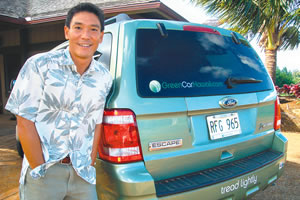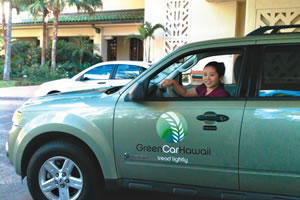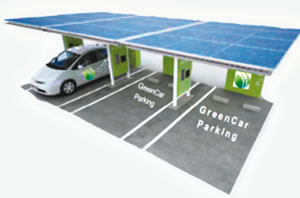A Green Way Of Thinking About Cars

Warren Doi: GreenCarHawaii is providing ‘a true clean-energy solution
A $250,000 grant accelerates GreenCarHawaii’s plans to make electric cars available for sharing
Electric vehicles powered by the sun’s energy is a concept GreenCarHawaii’s Warren Doi hopes to facilitate on Kaua’i. And after recently receiving a $250,000 grant to help expand the business and install solar-powered electric vehicle charging stations across the island, it “accelerated our ability to execute” the sustainable idea, he says.
“We’re trying to get to that point where we have critical mass … more of a network of cars,” he adds.
Helping the island generate its own transportation power, one less fossil fuel-burning outlet at a time, Doi launched a car-sharing program in partnership with Grand Hyatt Kaua’i Resort and Spa this summer, which already has been deemed a success, he says.
“The partnership with GreenCarHawaii has been great,” says Grand Hyatt Kaua’i public relations manager Diann Hartman. “Guests are taking advantage of the flexibility of renting a car by the hour or day through them, and we have heard nothing but glowing comments on the ease of rental and use of the cars.”

Moani Lee manages GreenCarHawaii at the Hyatt
GreenCarHawaii currently has a handful of hybrid vehicles available to rent for $15 an hour for visitors at the Grand Hyatt and at Pure Kaua’i. By January, the business also will have five all-electric plug-in vehicles.
In addition, Doi and his business partner Justin MacNaughton are working on constructing five charging stations to support the South Shore and grow from there.
The carports will be self-generating, gathering power from the sun using photo-voltaic cells located on the roofs of the station with “level three” charging outlets that take 15 minutes to power a vehicle for 100 miles.
“To produce energy from the sun completes the loop. A true clean-energy solution – no emissions,” Doi says. “It really makes sense on-island.”
The eventual goal, he says, would be to provide a set of electric vehicles for use to the general public, a true car-share system, with charging stations across the island at multiple self-serve gathering locations.
An island that depends almost entirely on imported oil is no longer sustainable, he explains.
“Our intent is to be not solely using any one technology, but to be independent of it,” he says.
“I wanted to provide the business in general because cars are the biggest emitters of carbon dioxide, and I think we can make a big impact by providing true alternatives for the community.”

An artist’s rendering of a new electric charging station
Enhancing the sustainable model is part of GreenCarHawaii’s business plan, as well as creating “a diversified economic base locally so that people can stay here and find jobs,” says Doi. “Most people have to leave to get good jobs, and I’ve certainly felt that.”
But providing a green platform for alternative energy for new technologies will help transition from a visitor-based economic industry so future generations of kama’aina can come home.
“My desire to preserve the environment is for my children,” says Doi, who with wife Kelly is the father of Justin, 6, and Sydney, 4.
Receiving the state grant was like icing on GreenCarHawaii’s sustainable business model cake, he says.
You must be logged in to post a comment.




There are no comments
Add yours